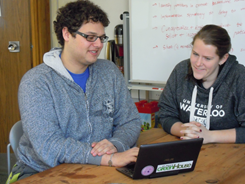

Dean, a fourth-year Geomatics student, had lived at St. Pauls in his first two years at UWaterloo. When he heard about GreenHouse, he liked the idea of a program that encouraged people to develop their own interests, so he joined the GreenHouse community last fall. He has diverse interests and is part of an interdisciplinary program; he went through several ideas before he found the one he was most passionate about.
Dean was working on a project that attempted to adapt the Montessori education model to find innovative ways to teach food literacy to children when GreenHouse Director Tania Del Matto introduced him to PhD candidates Ryan Clement and Steve Wilcox, who work with the University of Waterloo’s Games Institute in in their research.
Dean, who was raised in a family who are avid fans of technology, became even more passionate about the power of games as a tool for social change.
“The video game is a kind of art form, and like other art forms it can be a way of helping people to think critically and differently,” says Dean, who adds that the strength of video games is that, unlike television or other media where viewers are passive observers, a player engages and has agency, playing an active role.
For Dean, Ryan, Steve, and many others who look at gaming, there are positive and negative connotations to gamification. The negative comes with the idea of using games to re-program players in order to get a desired output — such as corporations using games to encourage productivity, a process Steve describes as exploitative. On the other hand, games can be used positively to “raise awareness in a deprogramming way: Helping players think differently, to deconstruct norms, to work against what we already know, to do justice to life’s messiness.”
Dean is interested in educating people about the power of games as a tool for social change. He is in the process of working with Steve to develop both a taxonomy of games for social change and a best practices guide for such games. This work will then inform the creation of a GreenHouse workshop on the use of games for social change.
“My project is considerably more academic than most GreenHouse projects,” says Dean. “What I’m trying to do is to educate the wider public on social issues in a different way.” Dean values the commitment of GreenHouse leaders and students to helping students succeed, whether their ideas are non-profit, for-profit or academic. “It’s an amazingly supportive environment and we all support one another. Criticism is always constructive.”
Dean is particularly appreciative of the connections he’s made through GreenHouse, saying he wouldn’t have even known about the Games Institute without an introduction from GreenHouse. “It’s not an understatement to say that thanks to GreenHouse, you can meet with all kinds of important people.”
Dean has encountered people who believe technology is ruining communication, but he’s both passionate and realistic about its costs and enormous benefits. “The criticism of video games,” he says, “has been said about every other major technological change and tool, including the novel, but games can be used to creatively draw attention to social issues and help people think differently about them.”
For more information about the University of Waterloo’s Games Institute and the GET-FACTS project, visit: https://uwaterloo.ca/games-institute/student-research
Ryan Clement has been working on the GET-FACTS project since January 2014. His research surrounds the effectiveness of games as tools for intercultural communication. The Kitchen Table game, in which players must work together to ensure there's enough food for everyone, is a board game designed to foster empathy towards people with food allergies through co-operative game mechanics and interactive play.
Steve Wilcox joined the GET-FACTS project in September 2014, for which he is developing a digital game that raises awareness of life with food allergies. His research revolves around the idea that games excel at teaching players how to situate knowledge. Such an approach treats games as interactive knowledge translators, capable of moving practical information between different and diverse contexts. In this way, games can be thought to influence our capacity to understand and, ultimately, empathize with various people, communities, and cultures. You can read more about Steve’s work on his HASTAC blog.